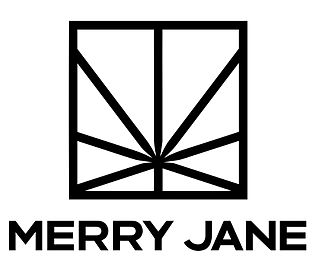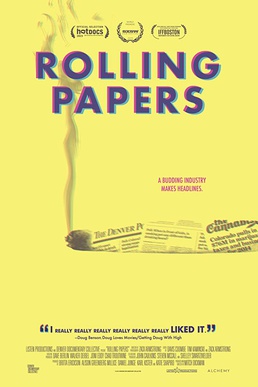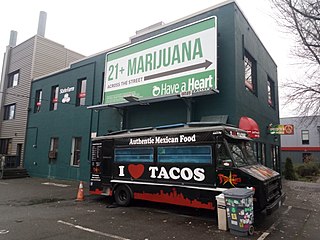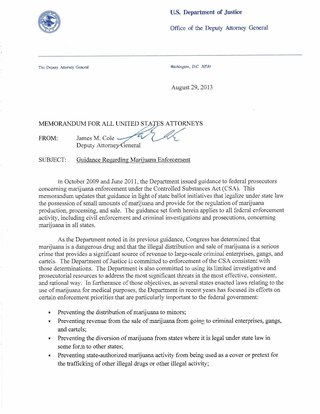Related Research Articles

In Colorado, cannabis has been legal for medical use since 2000 and for recreational use since late 2012. On November 7, 2000, 54% of Colorado voters approved Amendment 20, which amended the State Constitution to allow the use of marijuana in the state for approved patients with written medical consent. Under this law, patients may possess up to 2 ounces (57 g) of medical marijuana and may cultivate no more than six marijuana plants. Patients who were caught with more than this in their possession could argue "affirmative defense of medical necessity" but were not protected under state law with the rights of those who stayed within the guidelines set forth by the state. The Colorado Amendment 64, which was passed by voters on November 6, 2012, led to recreational legalization in December 2012 and state-licensed retail sales in January 2014. The policy has led to cannabis tourism. There are two sets of policies in Colorado relating to cannabis use: those for medicinal cannabis and for recreational drug use along with a third set of rules governing hemp.

In the United States, cannabis is legal in 38 of 50 states for medical use and 24 states for recreational use. At the federal level, cannabis is classified as a Schedule I drug under the Controlled Substances Act, determined to have a high potential for abuse and no accepted medical use, prohibiting its use for any purpose. Despite this prohibition, federal law is generally not enforced against the possession, cultivation, or intrastate distribution of cannabis in states where such activity has been legalized. On May 1, 2024, the Associated Press reported on plans by the Drug Enforcement Administration to move marijuana to the less-restrictive Schedule III.

"Weed the People", officially "Weed the People: A Cannabis Legalization Celebration", was an event held in Portland on July 3, 2015, two days after recreational marijuana became legal in the U.S. state of Oregon. Sponsored by the Portland Mercury and two cannabis companies, the event was attended by an estimated 1,500–2,000 people, who were provided up to seven grams of marijuana for immediate consumption or to take home. Organizers complied with restrictions on recreational sales by distributing free cannabis and required attendees to pay an entry fee. More than 1,300 tickets were sold, but the building's 500-person capacity meant long wait times to enter. Media outlets reported on the historic nature of the event, which was described as a "stoner's paradise" and a celebration of freedom.

Cannabis in Vermont as of May 2004 is legal for medical use, and legal for recreational use as of July 1, 2018.
Cannabis tourism in the United States is a form of drug tourism that exists in recreationally legal cannabis states. As of May 2023, 23 states, Washington, D.C., and Guam have legalized recreational cannabis.

Ricardo Baca is an American journalist best known for being the first full-time marijuana rights editor for a major American newspaper. He was an editor at The Denver Post, producing The Cannabist for over three years until December, 2016. He is the "central character" of the 2015 documentary film Rolling Papers. He also shares his name with the first person to be convicted for the possession of marijuana after the Marijuana Tax Act of 1937 was put into action.

Merry Jane is a cannabis-focused digital media platform launched by rapper Snoop Dogg in 2015, with media entrepreneur Ted Chung. The site features editorial content on the business and politics of the cannabis industry, original video series as well as a database for identifying cannabis strains and dispensaries.

Cannabis in Washington relates to a number of legislative, legal, and cultural events surrounding the use of cannabis. On December 6, 2012, Washington became the first U.S. state to legalize recreational use of marijuana and the first to allow recreational marijuana sales, alongside Colorado. The state had previously legalized medical marijuana in 1998. Under state law, cannabis is legal for medical purposes and for any purpose by adults over 21.

The Cannabis Act is a law which legalized recreational cannabis use in Canada in combination with its companion legislation Bill C-46, An Act to Amend the Criminal Code. The law is a milestone in the legal history of cannabis in Canada, alongside the 1923 prohibition.
Rachel K. Gillette is an American attorney who specializes in law relating to marijuana and the cannabis industry. Gillette is based in Lafayette, Colorado. As a lawyer, she is licensed to practice law in Colorado and Connecticut.

Rolling Papers is a 2015 documentary film directed by Mitch Dickman and featuring Ricardo Baca. The "deceptively rote title" is said to be a winking reference to Baca's work as a newspaper writer.

Weed the People: The Future of Legal Marijuana in America is a 2015 book written by Bruce Barcott and published by Time Books.

The International Church of Cannabis is a religious organization in Denver that uses cannabis as a sacrament. Members claim the use of cannabis helps elevate people to a higher understanding of self.
Cannabis product testing is a form of product testing analyzes the quality of cannabis extracts, edibles, and THC and CBD levels in an emergent consumer market eager to sell adult use products. Analytical chemistry and microbiology laboratories are important entities in consumer protection. These labs not only determine the condition and viability of cannabinoids, water content, heavy metals, pesticides, terpenes, yeast, but also the presence of mold, mycotoxins, and solvents. These laboratories emerged when advocates of cannabis testing raised concerns about potential contaminants.

Cannabis advertising is the advertising of cannabis products to consumers by the cannabis industry through a variety of media. It is regulated by U.S. states. Some or all forms of cannabis advertising are banned in many countries.

The Cole Memorandum was a United States Department of Justice memorandum issued August 29, 2013, by United States Deputy Attorney General James M. Cole during the presidency of Barack Obama. The memorandum, sent to all United States Attorneys, governed federal prosecution of offenses related to marijuana. The memo stated that given its limited resources, the Justice Department would not enforce federal marijuana prohibition in states that "enacted laws legalizing marijuana in some form and ... implemented strong and effective regulatory and enforcement systems to control the cultivation, distribution, sale, and possession of marijuana," except where a lack of federal enforcement would undermine federal priorities.
Le'Or is a 501(c)(3) organization in Portland, Oregon. It was founded in 2015 by Roy and Claire Kaufmann. The group publishes a haggadah via its website that substitutes cannabis for lettuce in the seder plate and promotes consumption of cannabis as part of the sacred rituals of Pesach (Passover). The haggadah includes the "Ten Plagues of the Drug War" and was meant to inspire discussion about the meaning of bondage in the modern age of mass incarceration and the war on drugs.
Women have been active in the cannabis industry, cannabis legalization, cannabis testing, and cannabis rights since the earliest days of commercialization, but they have also faced gendered obstacles impeding their growth in an industry worth over 12 million dollars since 2019. "The American cannabis industry accounted for $10 billion of 2018’s [global] figures, with the average U.S. dispensary pulling in $3 million a year."
The Cannabis Regulation and Tax Act is an act legalizing and regulating the production, consumption, and sale of cannabis in Illinois. It was approved by both houses by May 31, 2019 and came into effect January 1, 2020.
References
- ↑ Will Bunch (November 27, 2012), "Breaking news: Philly.com launches regular pro-pot column", The Philadelphia Inquirer
- ↑ Iman Sultan (October 18, 2016), "Temple offering news course on marijuana", The Temple News
- ↑ Jack Smith (March 4, 2014), Meet Chris Goldstein, NJ's Own Pot Reporter, Center for Cooperative Media at Montclair State University
- ↑ Kwame Opam (December 31, 2013), "The Denver Post launches marijuana culture site The Cannabist", The Verge
- ↑ Ricardo Baca (March 23, 2015), "Forbes just hired Julie Weed to cover pot. And yes, that's her real last name", ThenCannabist
- ↑ Lauren Gustus; Madeline Novey (August 13, 2015), "Meet our new columnists, cartoonists", The Coloradoan
- ↑ "Midweek reading", Seattlish, August 10, 2016, retrieved 2017-04-19
- ↑ Meagan Angus (December 6, 2017), "Celebrating Five Years of Legal Weed in Washington State – A look back at a hazy half-decade", Seattle Weekly
- ↑ Cannabis at a Crossroads: a KQED Newsroom Special, KQED
- ↑ Alex Halperin (January 1, 2018), "High time: introducing the Guardian's new cannabis column for grownups", The Guardian
- ↑ "The Xtreme Green Scene", The Aspen Times, January 25, 2018
- ↑ LegalMarijuana at Associated Press News (web)
- ↑ Cannabis topic index, Deutsche Welle
- ↑ Lifestyle→Health→Marijuana news and videos at ABC News online
- ↑ Legal pot index, NBC News
- ↑ Legalization of marijuana index, NPR
- ↑ "Los Angeles Times", The Rolling Paper
- ↑ "Marijuana and medial marijuana". Official website. The New York Times.
- ↑ The Seattle Times marijuana topic index
- ↑ The Denver Post marijuana topic index
- ↑ Pot News, Las Vegas Review-Journal
- ↑ "Marijuana banking", American Banker , accessed 2018-03-17